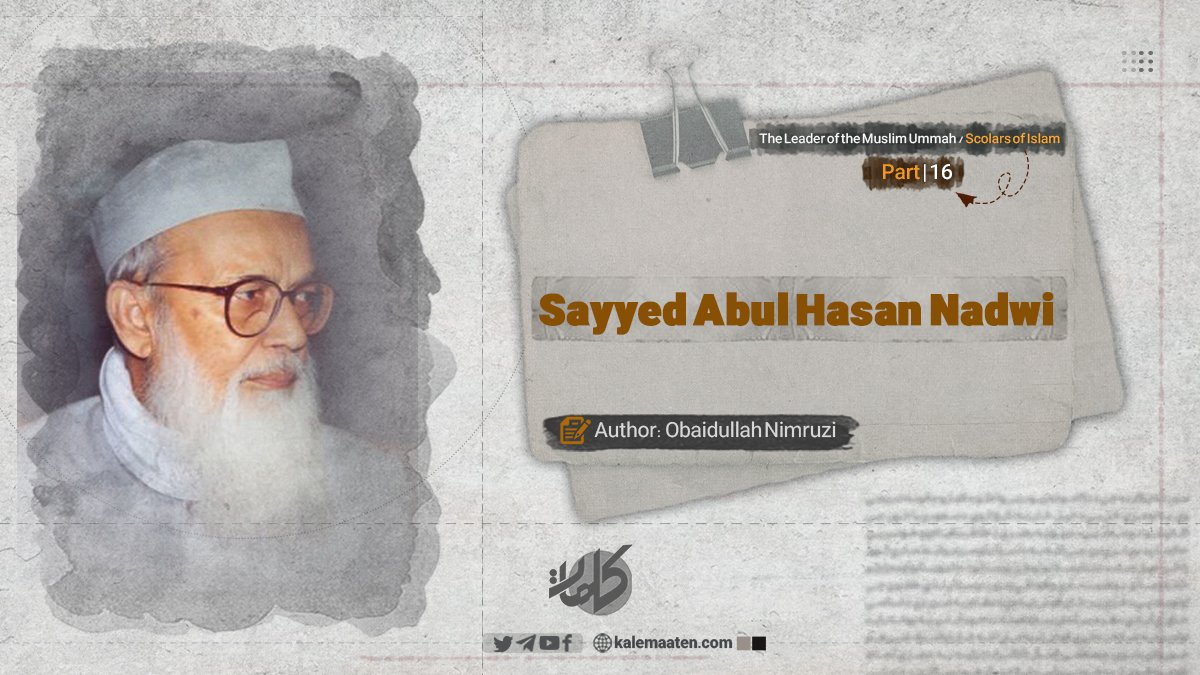
Author: Obaidullah Nimruzi
Allama Sayyed Abul Hasan Nadwi “MAPH” (Part 16)
Travel to England
In 1983, Mawlana Nadwi traveled to England to participate in the founding event of the Islamic Center at the University of Oxford in London, following an invitation sent to him. His objective was to engage with Western culture, closely observe, and discuss opinions with Westerners about Islam. He later wrote an article on this subject, which was translated into English. During his visit, Mawlana arranged a meeting with scholars, and after a brief conversation with Arabic speakers, he read a poem by Dr. Muhammad Iqbal Lahori, an experienced Islamic thinker who had spent a significant amount of time in the West and was well-acquainted with Western sciences and philosophy.
Mawlana Nadwi traveled to England again in 1985 to officially establish the Islamic Center at Oxford University. He remarked on the state of destruction that was about to engulf humanity before the arrival of the Holy Prophet, peace and blessings of Allah be upon him, who breathed life into it once more. He asserted that the significant progress humanity has made in recent centuries is owed to that great jihad for the salvation of mankind, with the Holy Prophet, may Allah bless him and grant him peace, as its leader and guide.
In 1992, he again visited England, participating in the annual meeting of the Islamic Center of Oxford and delivering a speech at the Islamic Institute of London. In his blessed verses, Allah Almighty speaks to the believers of that time, reminding them that if they do not unite as a group to save humanity and embody the characteristics of faith, great sedition and corruption will arise on earth. He compared this situation to the empires of Iran and Rome, which, despite their power, were not as impactful in terms of faith.
He addressed the Muslims of Europe and England, saying, “If you do not become the bearers of the message of Islam and invite others to it, corruption will spread everywhere, and the world will be filled with sedition.” He concluded by explaining a poem of Iqbal for them:
ناموس ازل را تو امانی تو امینی دارای جهان را تو یسارى تو يمينى
ای بندۀ خاکی تو زمانی تو زمینی صهبای یقین درکش و از دیر گمان خیز
از خواب گران خواب گران خواب گران خیز از خواب گران خیز
فریاد ز افرنگ و دلاویزی افرنگ فریاد ز شیرینی و پرویزی افرنگ
عالم همه ويرانه ز چنگیزی افرنگ معمار حرم باز به تعمير جهان خيز
از خواب گران خواب گران خواب گران خیز از خواب گران خیز
The main idea of this poem revolves around awakening from a deep metaphorical sleep and recognizing one’s divine role and potential in the world. It contrasts the current chaotic state of the world, influenced by foreign (particularly Western) cultures, with the call to rise and rebuild a more meaningful existence. The poem emphasizes self-awareness, spirituality, and the urgency to act against destructive influences, urging the reader to embrace their true essence and purpose.
Burma Trip
At the beginning of 1960, Mawlana visited Burma, where he addressed the people of Rangoon: “Allah Almighty has favored Muslims with good positions in such a large city in terms of financial superiority and worldly prestige; this is cause for happiness. However, it is concerning that Islamic teachings are rarely reflected in ethics and good qualities.” He recited the verse: “I am good to you and I am afraid of the punishment of the Day of Judgment.” A few days after Mawlana’s return from Burma, a communist revolution occurred, prompting many Muslim businessmen to flee the country.
Continues…


